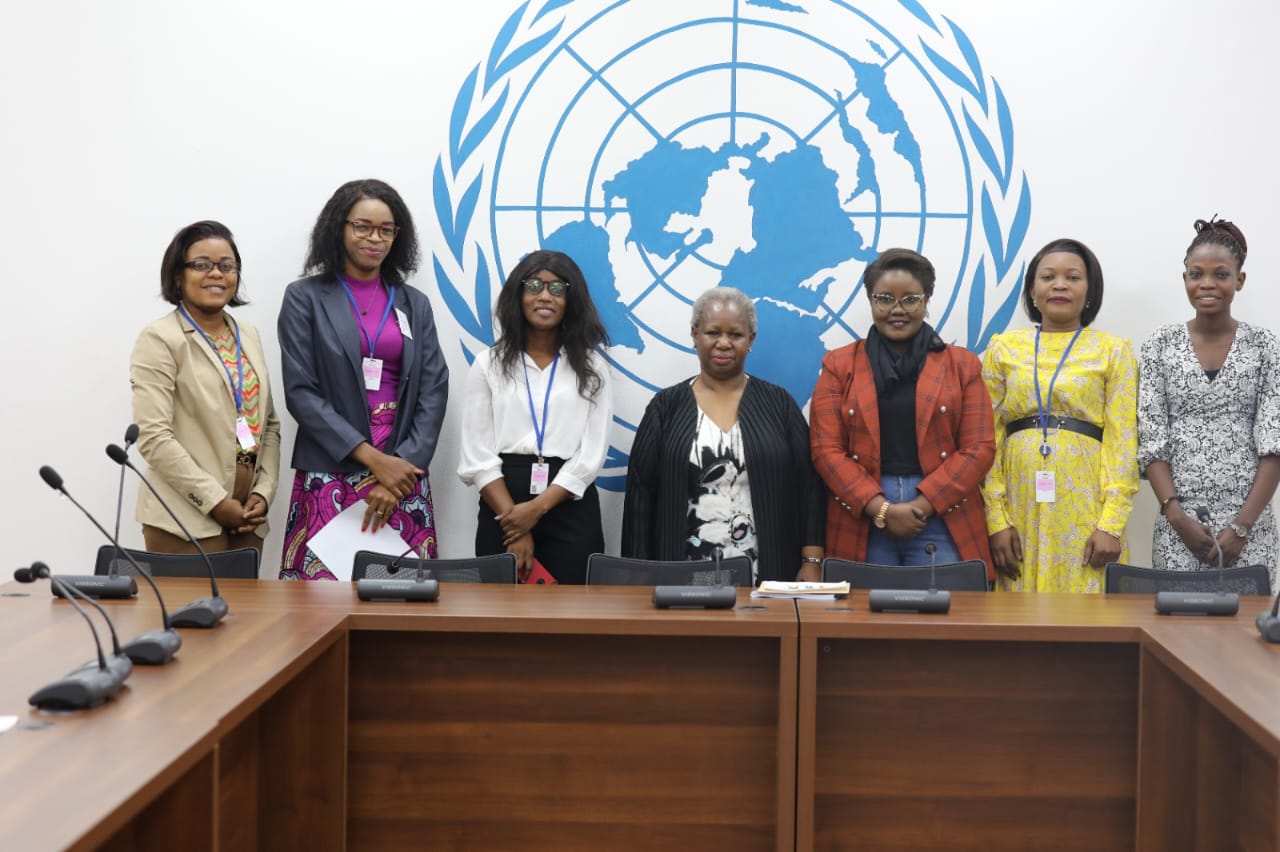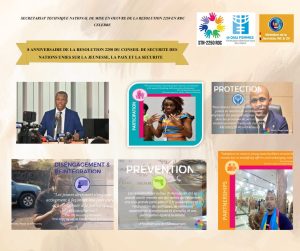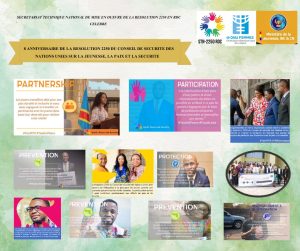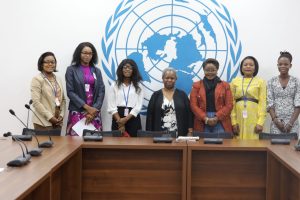
Youth Call for Peace: A Perspective on the DRC Situation on the 8th Anniversary of the UNSCR 2250 on Youth, Peace and Security.
“Violence is never the solution. Congolese youth join forces to invest in peace efforts”.
In a video that circulated on social media a week ago, a young woman was violently beaten by men in Malemba Nkulu during a clash between Kasaians and Luba residents in the Democratic Republic of the Congo’s (DRC) Haut-Lomami province. People were killed as a result of ethnic conflict in Malemba-Nkulu, where youth groups targeted residents of the Kasai region, resulting in a surge in violence. Furthermore, with less than a month until the scheduled election on December 20th, 2023, violence between pro-government (Wazalendo) forces and M23 rebel groups has escalated in the Eastern DRC provinces, engulfing civilians. Meanwhile, the government has requested that the EAC force and the United Nations Peacekeeping Mission (MONUSCO) leave the country due to inefficiency and failure to end the conflict. It is in that political insecurity context that hope has dwindled in the Masisi, Rutshuru, and Kwamouth territories, where men and women would be unable to vote in the upcoming December 20th, Election in the DRC. Those territories are controlled by the M23 rebels (Masisi and Rutshuru) and the Mobondo militia in Kwamouth (Mai Ndombe). Aside from the complex and intense security environment, there is also a tense electoral campaign marked by distrust among actors and the exclusion of certain territories due to insecurity and violence.


We young people, as future leaders of the country, have witnessed how political manipulation has fueled the wave of violence that has swept the country from east to west. We understand that only by committing to peace and security can we secure our country’s future. Fortunately, we do not wait for peace to happen; instead, we work toward it by helping prevent conflict and protect our communities through youth-led local initiatives.
The Congolese YPS coalition is a prime example of these efforts, implementing local projects to ensure that provincial development plans in the Nord and South Kivu provinces incorporate the voices and needs of young people. At a national level, the government agency responsible for YPS implementation called STN-2250 (Secretariat Technique National de mise en Oeuvre de la Resolution 2250 en RDC) is promoting political coordination to amplify the voices of young people in remote areas, allowing them to contribute to policy formulation and implementation. The launch of the Congolese YPS NAP (National Action Plan) is one of many other youth-led initiatives urging the Congolese government to increase youth participation in decision-making by including youth in political processes and policy discussions as a critical step toward effectively addressing the security crisis. The involvement of young voices in decision-making ensures their perspectives are taken into consideration, paving the way for sustainable solutions.

The Democratic Republic of the Congo faces ongoing conflict and violence, which poses a major challenge to youth in their efforts to promote peace. Young people are often excluded from decision-making and policy discussions, denying them meaningful participation in peacebuilding processes. The patriarchal system tends to view young people, especially young women, as incapable of bringing solutions to the crisis, preventing them from taking part in high political peace negotiations such as the current Luanda and Nairobi peace negotiations. There is a need to make young people’s voices count instead of just counting their presence as stipulated in the UNSCR2419.
As young people, we have been disproportionately affected by the security crisis in the DRC. We possess valuable insights into the root causes of the problem, which prevent us from realizing our full potential. Unfortunately, we have been associated with endemic violence, forced displacement, and the recruitment of child soldiers. These issues deprive young people of their right to education, security, and a promising future. We have lived in fear and faced bleak prospects in the unresolved security crisis that has been devastating the DRC for more than two decades now. Furthermore, high levels of poverty and unemployment have hindered the youth’s ability to contribute to peace efforts. Limited access to education and healthcare has exacerbated the challenges that young people face. Nevertheless, the youth in the DRC have a strong determination to promote peace and are calling for an end to war and violence. They are also advocating for investment in social infrastructure and youth-led peacebuilding initiatives. As the future leaders of society, it is crucial for us, the youth, to raise our voices and advocate for peace, justice, and investment in our communities. It is essential to highlight the significance of this global campaign to end war, save lives, and invest in peace.
Impact of the conflicts on the lives of the people
The ongoing conflicts in the Democratic Republic of Congo (DRC) have significantly impacted the lives of its people, resulting in widespread displacement, loss of livelihoods, and the violation of human rights. Sadly, the youth of the DRC have been hit the hardest, facing limited access to education and employment opportunities, as well as being drawn into armed groups. However, there is hope in the « Global Youth Call: End War, Save Lives, Invest in Peace » campaign, which emphasizes the importance of involving young people in peacebuilding initiatives. By supporting their efforts and harnessing their potential, we can promote peace in the DRC. To achieve this, action points such as silencing guns, fostering inclusive dialogue, and rebalancing military expenditure toward peacebuilding must be prioritized. It’s crucial to recognize the essential role of youth in implementing these measures and upholding the dignity of all people. By highlighting the challenges faced by the youth, we hope to humanize the conflict and showcase their resilience and determination in the face of adversity.
The 8 Anniversary of the UNSCR2250 and the Global Youth Campaign:
Youth living in conflict-affected regions, experience firsthand the devastating consequences of war. Many of us have lost loved ones, witnessed violence, and endured the trauma of displacement. Our voices are often overlooked, but we possess a unique insight into the reality of conflict and its impacts on our lives. We have dreams, aspirations, and a desire for peace and stability. Our perspective should be actively included in discussions and decisions regarding the DRC’s future.
Investing in youth is not simply an act of charity but a strategic approach to achieving lasting peace and development. Hence, the 8 anniversary of the UNSCR2250 which is happening during the launch of the global youth campaign #YouthWantPeace to end war, save lives, and invest in peace, provides a platform for young people to unite and demand change, highlight the initiatives and advocacy efforts of young Congolese individuals and organizations. It should highlight the creative and innovative approaches employed by young people to promote peace and reconciliation and their vision of a more inclusive and prosperous future. This campaign #YouthWantPeace recognizes that peace in the DRC, and elsewhere cannot be achieved solely by political leaders or international organizations; it requires the collective efforts of the global youth community. By rallying international support, this campaign aims to generate awareness, pressure decision-makers, and secure sustainable solutions.
As we celebrate the 8 Anniversary of the UNSCR2250, today, let us keep amplifying young people’s voices and mobilizing to support their cause.
——————————————————————————————————————
Marie-Rose Tshite
On December 9th, 8 anniversary of the UNSCR2250
National Coordinator of the STN-2250
